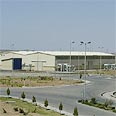
Iran: We'll install 3,000 centrifuges at Natanz
Several hours after UN Security Council votes to impose sanctions designed to stop nuclear efforts, Tehran's top nuclear negotiator says Islamic republic will push forward immediately with efforts to enrich uranium
"From Sunday morning, we will begin activities at Natanz – site of 3,000-centrifuge machines - and we will drive it with full speed. It will be our immediate response to the resolution," the Kayhan newspaper quoted Ali Larijani, Iran's top nuclear negotiator, as saying.
Iranian Foreign Ministry spokesman Muhammad Ali Husseini responded to the Security Council’s decision to impose sanctions on Iran, saying that “the unjust decision of the Security Council will not affect the tenacity and will of the Iranian people to continue with the nuclear program.”
“While the prime minister of the Zionist regime publicly admits he has nuclear weapons, not only does the silence of Security Council members confirm his statements, but some even openly justify them,” he added.
On Saturday, the Security Council voted unanimously to impose sanctions on Iran for refusing to suspend uranium enrichment, increasing international pressure on the government to prove that it is not trying to make nuclear weapons.
Iran immediately rejected the resolution. Larijani was quoted by the paper as saying, "We have said many times before that if the Westerners want to use the Security Council as an instrument, it will not affect our will. And it will make us more decisive in realizing our nuclear aims."
He said the Security Council had discredited itself by approving the resolution.
Importance of diplomacy
The result of two months of tough negotiation, the resolution orders all countries to stop supplying Iran with materials and technology that could contribute to its nuclear and missile programs. It also freezes the Iranian assets of 10 key companies and 12 individuals related to those programs.If Iran refuses to comply, the council warned it would adopt further nonmilitary sanctions, but the resolution emphasized the importance of diplomacy in seeking guarantees "that Iran's nuclear program is exclusively for peaceful purposes."
Iran insists its nuclear program is intended to produce energy, but the Americans and Europeans suspect its ultimate goal is the production of weapons.
The United States has said it hopes the resolution will clear the way for tougher measures by individual countries, particularly Russia.
The Bush administration had pushed for tougher penalties. But Russia and China, which both have strong commercial ties to Tehran, and Qatar, across the Persian Gulf from Iran, balked.
To get their votes, the resolution dropped a ban on international travel by Iranian officials involved in nuclear and missile development and specified the banned items and technologies.
Dudi Cohen contributed to the report










